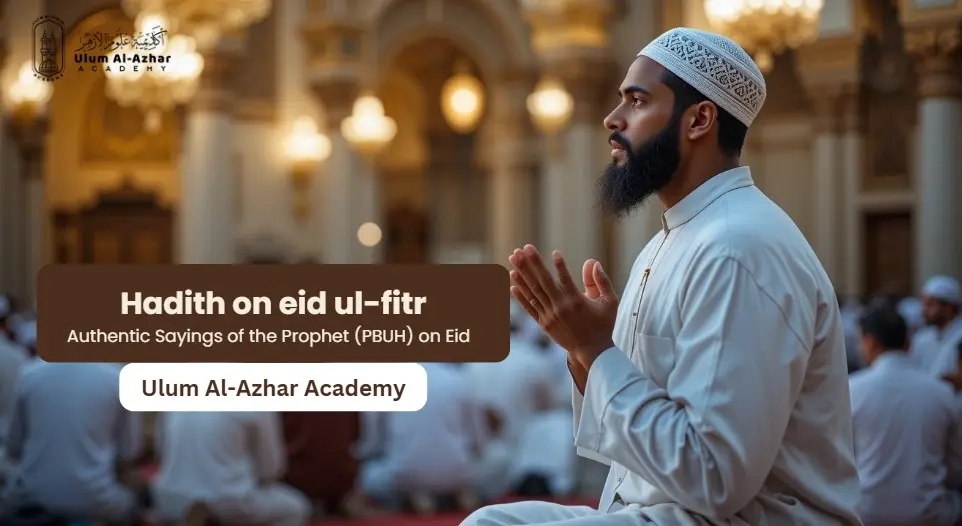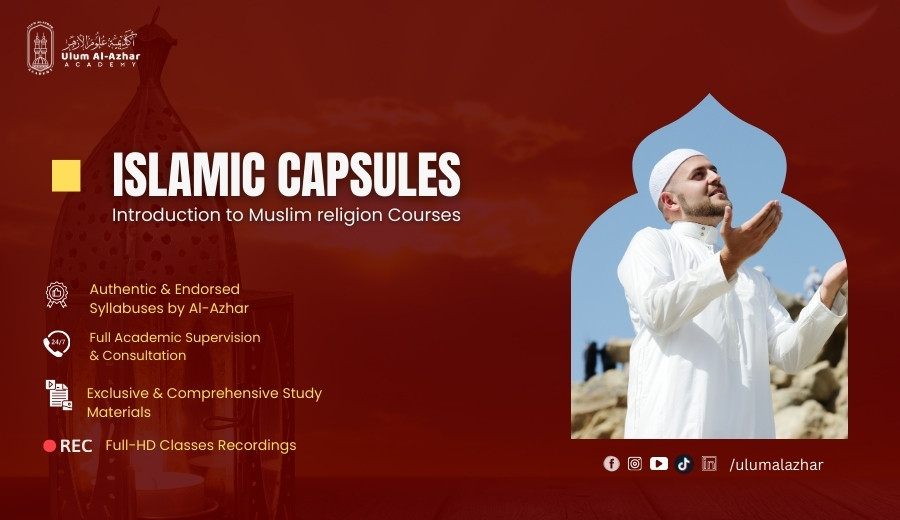
Hadith on Eid ul-fitr: Authentic Sayings of the Prophet (PBUH) on Eid
The hadith on Eid ul-Fitr informs us about how the Prophet Muhammad (PBUH) and his companions used to celebrate this sacred day.
Through the various hadiths, we get to know Eid Sunnah rituals like performing Eid prayer, distributing Zakat al-Fitr, reciting Takbir, and spreading happiness to family and friends. In this article, we will explore some of the hadith on eid ul-fitr and more! Let’s get started!
Authentic Hadiths About Eid al-Fitr and Its Significance

Here are Authentic hadith on eid ul-fitr showing its significance:
1. The Two Eids Are Days of Celebration
Eid al-Fitr is a celebratory day in Islam, marking the completion of Ramadan. The Prophet Muhammad (ﷺ) was eager to emphasize that these days are for joy, worship, and gratitude. Well-known hadith on Eid ul-Fitr states:
عَنْ أَنَسِ بْنِ مَالِكٍ، قَالَ: قَدِمَ رَسُولُ اللَّهِ ﷺ الْمَدِينَةَ وَلَهُمْ يَوْمَانِ يَلْعَبُونَ فِيهِمَا، فَقَالَ: “قَدْ أَبْدَلَكُمُ اللَّهُ بِهِمَا خَيْرًا مِنْهُمَا: يَوْمَ الْأَضْحَى وَيَوْمَ الْفِطْرِ”
Anas bin Malik (may Allah be pleased with him) reported: “The Messenger of Allah (ﷺ) came to Madinah, and the people had two days when they used to celebrate. He said, “Allah has replaced them for you with something better: the day of Adha and the day of Fitr.” (Sunan Abi Dawood 1134, Sahih by Al-Albani)
Begin your Private Islamic learning journey with a free Consultation session by Sheikhs from Al-Azhar, Egypt!
2. The Importance of Giving Zakat al-Fitr
Among the most significant aspects of Eid al-Fitr is obligatory payment of Zakat al-Fitr before the Eid prayer so that the poor people can also celebrate Eid festivities. A hadith on Eid ul-Fitr regarding it is as follows:
عَنْ ابْنِ عَبَّاسٍ، قَالَ: “فَرَضَ رَسُولُ اللَّهِ ﷺ زَكَاةَ الْفِطْرِ طُهْرَةً لِلصَّائِمِ مِنَ اللَّغْوِ وَالرَّفَثِ وَطُعْمَةً لِلْمَسَاكِينِ، فَمَنْ أَدَّاهَا قَبْلَ الصَّلَاةِ فَهِيَ زَكَاةٌ مَقْبُولَةٌ، وَمَنْ أَدَّاهَا بَعْدَ الصَّلَاةِ فَهِيَ صَدَقَةٌ مِنَ الصَّدَقَاتِ”
Ibn Abbas (may Allah be pleased with him) related: “The Messenger of Allah (ﷺ) enjoined Zakat al-Fitr as a purifying for the fasting person from vain speech and obscenities, and nourishment for the poor. Whoever gives it before the prayer, it is good zakah, and whoever gives it following the prayer, it is plain charity.” (Sunan Abi Dawood 1609, Hasan by Al-Albani)
3. Observance of the Eid Prayer
The Eid prayer is extremely significant, and it is strongly recommended to perform it. A hadith on Eid ul-Fitr commands men, women, and even those who do not usually pray to participate in the prayer:
عَنْ أُمِّ عَطِيَّةَ، قَالَتْ: “أَمَرَنَا – تَعْنِي النَّبِيَّ ﷺ – أَنْ نُخْرِجَ فِي الْعِيدَيْنِ الْعَوَاتِقَ وَذَوَاتِ الْخُدُورِ وَأَمَرَ الْحُيَّضَ أَنْ يَعْتَزِلْنَ مُصَلَّى الْمُسْلِمِينَ”
Umm Atiyyah (may Allah be pleased with her) narrated: “The Prophet (ﷺ) commanded us to bring out secluding women and menstruating women on the two Eids, but young girls. He prohibited menstruating women from approaching the place of worship.” (Sahih al-Bukhari 324, Sahih Muslim 890)
These hadiths underline the significance of Eid al-Fitr, inspiring festivity, benevolence, and social prayer. Accordingly, Muslims could maximize the blessed occasion.
Discover how to pray Salat Al Eid step by step!
The Prophet’s (PBUH) Sunnah on Eid al-Fitr: A Guide for Muslims
Some hadiths of Eid ul-Fitr inform us how to celebrate this blessed day in an Islamic manner.
1. Take a Bath Before the Eid Prayer
Taking ghusl (ritual bath) before going to the Eid prayer is recommended. There is a famous hadith of Eid ul-Fitr that mentions this practice:
عَنْ نَافِعٍ، أَنَّ عَبْدَ اللَّهِ بْنَ عُمَرَ كَانَ يَغْتَسِلُ يَوْمَ الْفِطْرِ قَبْلَ أَنْ يَغْدُوَ إِلَى الْمُصَلَّى
“Nafi’ reported that Abdullah ibn Umar (RA) used to perform ghusl on the day of Eid al-Fitr before going to the prayer area.” (Muwatta Malik 428, Sahih by Al-Albani)
This hadith shows that purifying oneself before the Eid prayer was a practice of the companions of the Prophet (PBUH), following his teachings.
2. Pre-Eid Eating
It is Sunnah on Eid al-Fitr to consume dates prior to the Eid prayer, concluding Ramadan. A hadith on Eid ul-Fitr states:
عَنْ أَنَسِ بْنِ مَالِكٍ، قَالَ: كَانَ رَسُولُ اللَّهِ ﷺ لَا يَغْدُو يَوْمَ الْفِطْرِ حَتَّى يَأْكُلَ تَمَرَاتٍ، وَيَأْكُلُهُنَّ وِتْرًا
Anas bin Malik (RA) reported: “The Messenger of Allah (PBUH) would never leave in the morning on the day of Eid al-Fitr until he had eaten a few dates, and he would eat an odd number.” (Sahih al-Bukhari 953)
This Sunnah reminds Muslims to begin Eid in gratitude by opening their fast before prayer.
3. Wearing the Best Clothes
It is recommended to wear one’s best and cleanest clothes on Eid. Hadith about Eid ul-Fitr states:
عَنْ جَابِرٍ، قَالَ: كَانَ لِلنَّبِيِّ ﷺ جُبَّةٌ يَلْبَسُهَا لِلْعِيدَيْنِ وَيَوْمِ الْجُمُعَةِ
Jabir (RA) reported: “The Prophet (PBUH) had a cloak which he used to wear on the two Eid days and Fridays.” (Sunan Ibn Majah 1138, Hasan by Al-Albani)
This hadith encourages Muslims to adorn themselves well and present themselves in their finest attire with humility.
Discover how to define Eid Al-Fitr and its significance!
4. Saying Takbir
Saying Takbir (Allahu Akbar) is a significant Eid Sunnah, from the evening before Eid until prayer. An Eid ul-Fitr hadith states:
عَنْ عَبْدِ اللَّهِ بْنِ عُمَرَ، أَنَّ رَسُولَ اللَّهِ ﷺ كَانَ يُكَبِّرُ يَوْمَ الْفِطْرِ مِنْ حِينَ يَخْرُجُ مِنْ بَيْتِهِ حَتَّى يَأْتِيَ الْمُصَلَّى
Abdullah ibn Umar (RA) reported: “The Messenger of Allah (PBUH) would recite the Takbir on Eid day from when he left the house until he reached the prayer ground.” (Sunan al-Daraqutni 2/44, Hasan by Al-Albani)
Saying “Allahu Akbar, Allahu Akbar, La ilaha illa Allah, Allahu Akbar, Allahu Akbar wa Lillahil Hamd” is a great way of remembering Allah and glorifying Him on this holy day.
5. Taking a Different Route Back Home After Eid Prayer
The Prophet (PBUH) also initiated deviating from the regular route while coming back home post-Eid prayer. A hadith of Eid ul-Fitr reads:
عَنْ جَابِرٍ، قَالَ: كَانَ النَّبِيُّ ﷺ إِذَا كَانَ يَوْمُ عِيدٍ خَالَفَ الطَّرِيقَ
Jabir (RA) reported: “The Prophet (PBUH), on the day of an Eid, used to go on a different way when returning home after prayer.” (Sahih al-Bukhari 986)
Scholars state that this was so that more could be greeted, joy could spread, and the roads could be witness to Muslim worship.
Explore the sacred and blessed times in Islam with Ulum Al-Azha!
Join our Sacred Months in Islam & Blessed Times course to discover the significance of holy months, special seasons, and the ways to maximize barakah in your life. Don’t miss this opportunity to deepen your connection with Allah and remember the Days of Allah! Enroll now and make the most of these divine moments!

Conclusion
Eid al-Fitr is a day of blessings, thanksgiving, and subservience, and following the Sunnah of the Prophet (PBUH) assists in celebrating the day in the utmost way.
Such Eid ul-Fitr hadiths highlight core Sunnah behavior such as bath, eating, dressing up, reciting Takbir, and coming back home through a new route.
Fulfilling such teachings allows Muslims to benefit the most during this blessed duration while being loyal to Islamic convention.
Book a free Consultation session and start learning!
FAQs
Is Eid-ul-Fitr mentioned in the Quran?
Eid-ul-Fitr is not directly mentioned in the Quran, but its significance is derived from the command to complete Ramadan fasting and give Zakat al-Fitr (Surah Al-Baqarah 2:185).
Is it haram to not celebrate Eid?
It is not haram to not celebrate Eid, but it is highly recommended in Islam to observe the occasion as a Sunnah of the Prophet (PBUH).

